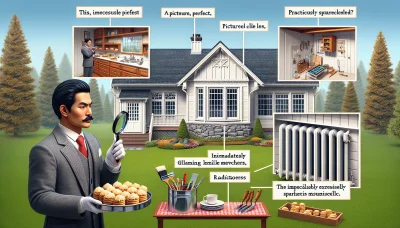Pros and cons of buying a house Quiz
Test Your Knowledge
Question of
Understanding the Housing Market
Current Trends in Real Estate
The real estate landscape is a dynamic arena, constantly influenced by fluctuating interest rates, consumer sentiment, and regulatory changes. As we navigate through the current market, we witness a trend towards sustainable living and smart home technologies that are reshaping buyer preferences. Keep your eyes peeled; these trends aren't just passing fanciesthey're the future of housing!
Urbanization continues to drive demand in city centers, while remote work policies introduced during the pandemic are now boosting appeal for suburban and rural homes. The surge in demand for spacious accommodations with home offices is not just a blipit's revolutionizing the way we think about our living spaces. This shift is an essential factor for potential investors and homebuyers to consider.
Impact of Economic Conditions on Property Values
Economic conditions act as puppeteers in the grand performance of property values, pulling strings through mechanisms like employment rates, inflation, and fiscal policy. A robust economy typically signals rising property values as more people can afford to buy homes. Conversely, economic downturns often lead to softer marketsbut savvy investors know that this can also mean opportunities.
The interplay between supply and demand is crucial; when inventory levels are low, competition heats up, pushing prices higher. Keep your finger on the pulse of interest rate changesthey're like the heartbeat of the housing market, dictating affordability and influencing buyer behavior profoundly.
Predicting Future Market Movements
Making predictions about future market movements is akin to forecasting the weatherthere are indicators and models, but surprises are always possible. Analysts pore over data like housing starts, sales volumes, and price trends to catch a glimpse of what's ahead. Stay informed by following reputable real estate forecasts and market analysesthey're your crystal ball into future trends.
Remember that real estate is inherently local. National trends provide a backdrop, but local factors can significantly sway market movements in your area. Always dive deep into regional data before making any property-related decisionsthe devil's in the details!
How Location Influences Home Buying
"Location, location, location!" It's not just a catchy phrase; it's a cornerstone principle in real estate valuation. Proximity to bustling city centers or serene natural landscapes can dramatically affect property appeal and value. Buyers prioritize locations based on lifestyle preferencesbe it vibrant nightlife or peaceful suburbialocation dictates desirability.
Accessibility to transportation networks can make or break a deal; easy commutes are high on buyers' wish lists. A prime location near major highways or public transit hubs can command premium pricesmobility matters!
The Importance of School Districts and Amenities
School districts wield significant power in home buying decisionsfamilies often prioritize top-rated education options when choosing where to live. A stellar school district doesn't just benefit families with children; it can bolster property values across the board as it contributes to the overall attractiveness of an area.
Amenities such as parks, shopping centers, and restaurants enrich community life and enhance property desirability. They're not just conveniences; they're magnets that attract buyers looking for vibrant lifestyles.
Assessing Long-Term Development Plans
- Research Local Zoning Laws: Understanding zoning laws will give you insight into possible future developments that could impact property values.
- Monitor Infrastructure Projects: Upcoming infrastructure projects like new schools or transportation hubs can signal growth areas.
- Analyze Economic Growth Indicators: Look at employment rates and business expansions as signs of a prosperous community attracting more residents.
- Consult City Development Plans: Cities often have master plans outlining long-term development which can offer valuable foresight for potential changes in neighborhood dynamics.
- Stay Informed on Environmental Policies: Changes in environmental regulations or green space initiatives can influence future development patterns.
- Beware of Overdevelopment Risks: Be cautious about areas where rapid construction could lead to market saturation or loss of community charm.
- Evaluate Long-Term ROI: Consider how current developments will shape the areas desirability in the long run for sustained return on investment.
Financial Considerations of Homeownership
Initial Costs of Buying a House
The first hurdle in the journey to homeownership involves the initial costs. This includes a significant down payment, which typically ranges from 3% to 20% of the home's purchase price. The exact amount can vary widely based on loan type and the price of the house, so prospective buyers should prepare to save accordingly.
Beyond the down payment, closing costs and additional fees are inevitable. These can include loan origination fees, appraisal fees, title searches, and more. Closing costs usually total between 2% and 5% of the loan amount, so budgeting for these expenses is crucial for a smooth transaction.
Down Payment Requirements
Down payment requirements are pivotal in determining your home buying budget. They can influence your mortgage interest rate and whether you'll need to pay for private mortgage insurance (PMI). It's essential to explore various mortgage products as some offer lower down payment options, especially beneficial for first-time buyers.
Closing Costs and Additional Fees
Closing costs and additional fees must not be overlooked. They encompass a variety of expenses, including attorney fees, home inspections, and homeowners association fees if applicable. To avoid surprises, request a closing cost estimate upfront from your lender and real estate agent.
Long-Term Financial Commitments
Owning a home is a marathon, not a sprint, with financial commitments that extend far beyond the initial purchase. A mortgage is typically a decades-long commitment that comes in various formsfixed-rate, adjustable-rate (ARM), and otherseach with unique pros and cons affecting monthly payments and overall interest paid.
Mortgage Types and Interest Rates
- Fixed-Rate Mortgages: Offer stability with consistent monthly payments over the life of the loan.
- Adjustable-Rate Mortgages (ARMs): Feature lower initial rates that adjust over time, potentially leading to higher future payments.
- Government-Insured Loans: Such as FHA or VA loans, may provide options with lower down payment requirements but come with additional considerations.
- Jumbo Loans: Necessary for more expensive properties but come with stricter credit requirements and larger down payments.
Selecting the right mortgage type requires understanding your financial situation and long-term goals. Interest rates can dramatically affect the total cost over time; thus locking in a favorable rate can lead to significant savings. Always consult with a financial advisor or mortgage specialist to navigate these choices effectively.
Property Taxes and Home Insurance
Property taxes and home insurance are ongoing expenses that homeowners must budget for annually or as part of their monthly mortgage payment if escrowed. Property taxes are determined by local government assessments and can fluctuate over time. Home insurance rates depend on factors like location, home value, and coverage level.
In conclusion, thoughtful consideration of these financial aspects is vital when embarking on homeownership. From upfront costs like down payments and closing fees to ongoing commitments like mortgages, property taxes, and insurancebeing well-informed helps ensure fiscal responsibility and stability in your home-owning journey.
Advantages of Buying a House
Building Equity Over Time
One of the most significant advantages of buying a house is the ability to build equity. As you pay off your mortgage, you're essentially investing in your future, creating a financial cushion that can benefit you in the long run. Homeownership is not just about having a place to live, but also about building wealth as the value of your property increases over time.
Understanding Home Equity is crucial for any homeowner. Equity is the difference between what your home is worth and what you owe on your mortgage. Each mortgage payment means more ownership and less debt, growing your equity stake with every installment. This built-up equity can be leveraged for loans or as a hefty down payment on a new property.
Benefits of Property Value Appreciation
Property value appreciation is like an unseen force working in favor of homeowners. Over time, as markets rise, so does the value of your home. This natural increase can significantly boost your equity without additional effort on your part. It's an opportunity for passive financial growth that renting simply cannot match.
The historical trend shows that real estate often appreciates, making buying a house an investment that can pay off handsomely. While market fluctuations are inevitable, long-term homeowners typically enjoy substantial gains, transforming regular mortgage payments into sizable future wealth.
Personalization and Control
Freedom to Customize Your Living Space: When you own a home, the power to personalize and transform your living space is entirely in your hands. You can paint walls, change floors, and renovate rooms to suit your taste and needs without needing permission from a landlord. This freedom allows you to create a home that truly reflects who you are.
Owning brings with it control over every aspect of your living situationfrom pets to plantings. You're in charge of decisions that shape the comfort and aesthetics of your home, fostering an environment where you and your family can thrive.
Stability and Security of Ownership
The stability and security that come with homeownership are unparalleled. Unlike renters who face uncertainties like lease renewals and rent hikes, homeowners have consistent mortgage payments with fixed-rate options and no worries about eviction at the whim of a landlord.
Owning a house provides a permanent address and community ties that contribute to a sense of belonging and social stability. It's not just about having four walls; it's about laying down roots and building lasting relationships within a community.
- Tips for Building Home Equity Faster:
- Make Larger Down Payments: Start with more equity by putting down as much as you can afford when purchasing.
- Opt for Shorter Mortgage Terms: Though monthly payments may be higher, you'll pay off the principal faster and build equity quicker.
- Increase Property Value: Invest in home improvements that boost property valuethink kitchen upgrades or adding energy-efficient features.
- Extra Mortgage Payments: Paying extra towards your mortgage principal each month or year accelerates equity growth.
- Avoid Refinancing for Cash Out: While tempting, it reduces the equity you've worked hard to build up.
Challenges of Purchasing a Property
Maintenance Responsibilities
Stepping into the world of property ownership brings with it a host of maintenance responsibilities that can be both time-consuming and costly. Homeowners are solely responsible for all upkeep, which means no more calling the landlord when the sink leaks or the furnace quits.
Regular maintenance tasks such as lawn care, painting, and gutter cleaning require not just money, but also time and planning. Neglecting these tasks can lead to bigger problems down the line, making proactive maintenance a critical part of home ownership.
Regular Upkeep and Repairs
Consistent attention to minor repairs prevents them from becoming major expenses. Whether it's fixing a dripping faucet or replacing worn-out roofing shingles, staying on top of these tasks is essential for preserving your property's value and functionality.
Creating a schedule for regular maintenance can help distribute the workload throughout the year. This proactive approach minimizes surprises and helps maintain a comfortable living environment while safeguarding your investment.
Dealing with Unexpected Home Issues
Unexpected home issues can arise at any moment, often requiring immediate action to prevent damage. These can range from plumbing emergencies to electrical faults, and they test both the homeowner's resilience and financial planning.
- Set aside an emergency fund specifically for home repairs.
- Develop a network of trusted professionals you can call on when needed.
- Invest in quality insurance coverage to mitigate potential costs.
- Perform regular inspections to catch issues before they escalate.
- Prioritize repairs based on urgency and impact to avoid overwhelming situations.
Market Risks and Fluctuations
The real estate market is dynamic, with prices ebbing and flowing due to economic conditions, interest rates, and local demand. Understanding these market risks is crucial for making informed purchasing decisions that align with long-term financial goals.
Becoming familiar with market trends in your area can help predict the best times to buy or sell. However, even with diligent research, market shifts can be unpredictable, sometimes resulting in less-than-ideal timing for your transactions.
Navigating Buyer's vs. Seller's Markets
In a buyer's market, there are more homes available than buyers, giving purchasers the upper hand in negotiations. Conversely, in a seller's market, high demand and limited inventory tip the scales in favor of sellers, often leading to bidding wars and higher prices.
Familiarizing yourself with the current state of the market can inform your strategywhether that means waiting out a hot market or jumping on an opportunity during a cooler phase. Timing is everything, so monitor local trends closely.
The Risk of Depreciation
The threat of property depreciation looms over every real estate transaction. Factors like neighborhood decline or poor property maintenance can diminish your home's value over time. Strategic buying and consistent upkeep are key defenses against this risk.
To protect against depreciation, invest in locations with growth potential and maintain your property diligently. This way you help ensure that your investment appreciates rather than loses value as years go by.
Renting vs. Buying: A Comparative Analysis
Flexibility and Mobility of Renting
Renting offers unparalleled flexibility compared to buying a home. Tenants can relocate without the hassle of selling property, making it ideal for those with evolving career paths or personal circumstances. This flexibility is a significant draw for those who desire or require the ability to move frequently.
Furthermore, renting avoids the long-term commitment that comes with a mortgage. This is perfect for individuals who are not ready to settle down or are uncertain about their future income stability. Renters can enjoy living in a home that fits their current needs without worrying about the housing market fluctuations.
Ease of Relocation
The ease of relocation is a key advantage for renters. The process of moving out is typically straightforward, involving giving notice within the agreed period, as stipulated in the lease. This simplicity provides peace of mind for those seeking new opportunities in different locales.
Avoiding Long-Term Commitment
Choosing to rent can be a strategic decision to avoid long-term financial commitments. Renters are not tied down by property maintenance costs or mortgage interest rates, offering them financial agility that home buyers do not typically enjoy.
The Long-Term Benefits of Buying
Buying a home is often seen as an investment towards one's future. It promises potential passive income through renting out and could lead to significant capital gains over the years. Homeownership remains a cornerstone of many people's long-term financial strategies.
In addition to building equity, homeowners enjoy tax advantages that are not available to renters. These can include deductions on mortgage interest and property taxes, which can make a substantial difference in annual tax liabilities.
Potential for Passive Income through Renting Out
Owning a home allows individuals to generate passive income by renting out part or all of their property. This income can help offset mortgage payments and other ownership expenses, while also building equity in the property over time.
- Screen tenants carefully: To ensure reliable rental income, thorough background checks are essential.
- Regular maintenance: Upkeep prevents costly repairs down the line and keeps tenants happy.
- Understand landlord-tenant laws: Knowledge of legal requirements avoids disputes and ensures compliance.
- Have adequate insurance: Protect your investment against unexpected events with proper coverage.
- Consider hiring a property manager: If managing the rental seems daunting, professionals can help for a fee.
Tax Advantages for Homeowners
The tax benefits associated with homeownership can be substantial. From possible deductions on mortgage interest to certain home improvements, these incentives can greatly reduce annual tax burdens and enhance the overall value proposition of buying over renting.
Preparing for the Home Buying Process
Getting Your Finances in Order
Embarking on the home buying journey starts with a financial health check. Ensuring your finances are in tip-top shape is paramount. This involves reviewing your spending habits, cutting unnecessary expenses, and making sure you have a clear picture of your income and debts. A solid financial foundation is key to a smooth home buying experience.
Importance of Credit Scores in Mortgage Approval
Your credit score is like a golden ticket in the realm of mortgages. Lenders scrutinize it to determine your loan eligibility and interest rates. A higher credit score can unlock lower interest rates, which translates into significant savings over the life of your loan. It's crucial to check your credit report for errors and take steps to bolster your score well before house hunting.
Saving for a Substantial Down Payment
A substantial down payment reduces your loan amount and can exempt you from private mortgage insurance, leading to lower monthly payments. Saving aggressively and exploring various saving options will place you in an advantageous position when you find your dream home. Aim for at least 20% down payment it's challenging but definitely worth striving for!
Seeking Professional Assistance
Navigating the complex world of real estate demands expertise. Seeking professional help is not just advisable; it's essential! Professionals guide you through listings, negotiations, and legal intricacies, turning a daunting process into a manageable one.
Working with a Real Estate Agent
A real estate agent is your ally, equipped with market knowledge and negotiation skills. They provide invaluable insights into neighborhoods, market trends, and property values. An agent will also handle the heavy lifting of paperwork and coordination with sellers, making them an indispensable part of your home buying team.
- Choose an agent with stellar references.
- Look for someone who understands your needs and budget.
- Ensure they have experience in the specific area where you want to buy.
- Select an agent who communicates clearly and promptly.
The Role of a Mortgage Broker in Home Buying
Mortgage brokers are the bridge between you and potential lenders. Their role is to find you the best mortgage deals that fit your financial situation. They have access to a wide range of products and can negotiate terms on your behalf. Engaging with a mortgage broker can save you time and money by streamlining the search for the perfect mortgage plan.












